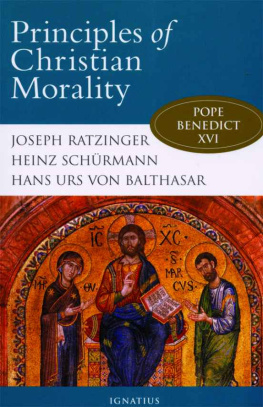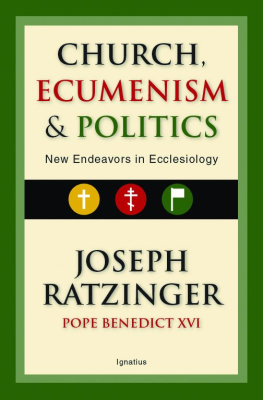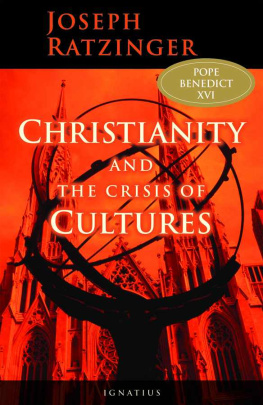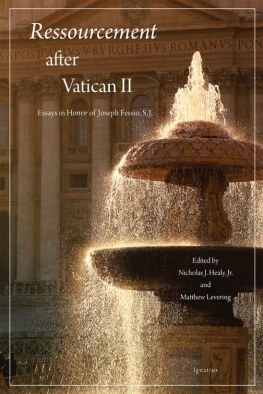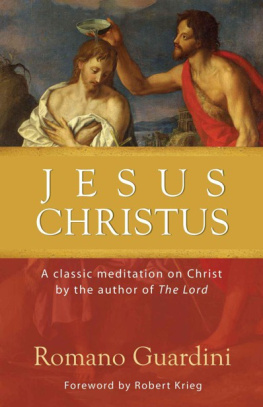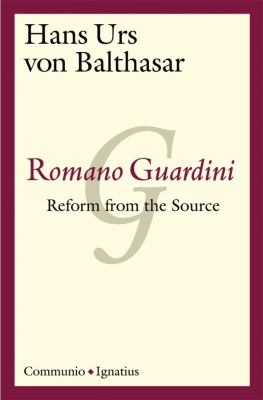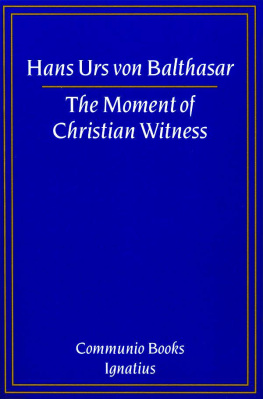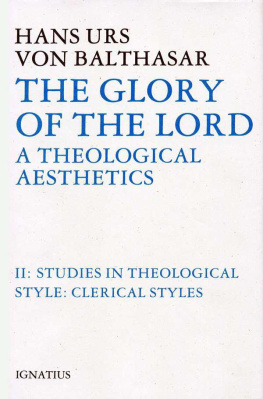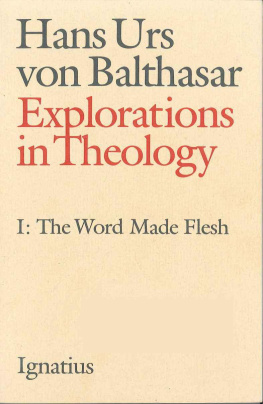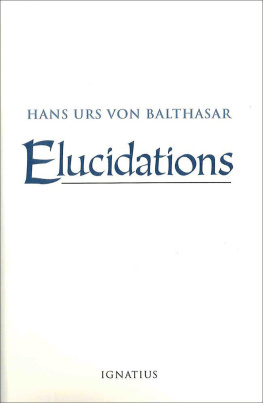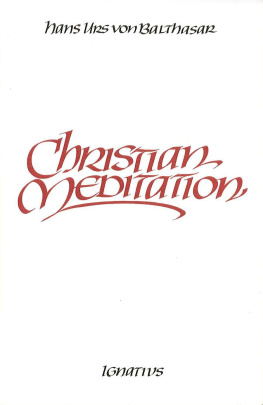Principles of Christian Morality
HEINZ SCHRMANN
JOSEPH CARDINAL RATZINGER
HANS URS VON BALTHASAR
Principles of
Christian Morality
Translated by Graham Harrison
IGNATIUS PRESS SAN FRANCISCO
Title of the German original:
Prinzipien Christlicher Moral
1975 by Johannes Verlag
Einsiedeln, Switzerland
Cover art:
Christ Enthroned between the Virgin and St. Mark (nave, west wall above main doors). 2nd half 13th century, Byzantine mosaic.
S. Marco, Venice, Italy
Cameraphoto / Art Resource, New York
Cover design by Roxanne Mei Lum
With ecclesiastical approval
1986 by Ignatius Press, San Francisco
Reprinted in 2006
All rights reserved
ISBN 978-0-89870-086-2
ISBN 0-89870-086-8
Library of Congress Control Number 85-82170
Printed in the United States of America
Contents
How Normative Are the Values and Precepts of the New Testament ?
The issue
I. Jesus Deeds and Words as the
Ultimate Ethical Norm
1. The Conduct of Jesusas an example and standard of a ministering and self-surrendering love
2. The Words of Jesusas the ultimate ethical norm
II. The Normative Character of Apostolic and Primitive Christian Values and Injunctions
1. The Theo-logically / Eschatologically Oriented Values and Precepts
2. The Particular Values and Precepts
Summary
The Churchs Teaching AuthorityFaithMorals
An outline of the problem
An initial response
Three examples of the interrelation of faith and morals
Faithmoralsteaching authority
Nine Propositions on Christian Ethics
Preliminary note
I. The Fulfillment of Ethics in Christ
1. Christ as the Concrete Norm
2. The Universality of the Concrete Norm
3. The Christian Meaning of the Golden Rule
4. Sin
II. The Old Testament Elements of the Synthesis to Come
5. The Promise (Abraham)
6. The Law
III. Fragments of Extrabiblical Ethics
7. Conscience
8. The Prebiblical Natural Order
9. Post-Christian Anthropological Ethics
Preface
Nowadays the question of the content and basis of the Christian ethos is becoming more and more prominent in theology; more than other problems, it touches the very nerve of the Christian life. It was this situation that caused the International Theological Commission, after years of preparatory work, to grapple with the issue in its December 1974 session. Many pieces of mosaic, as it were, were collected on that occasion, but they could not be assembled into a whole; here, two of those pieces are presented to the public.
For years, in his capacity as a member of the subcommittee responsible for moral questions, Heinz Schrmann has worked on the issue of the New Testaments contribution on ethical matters. After exhaustive discussion, the Commission adopted in general terms the results of his research on the question of the normative nature of New Testament values and precepts. Hans Urs von Balthasar presents nine theses outlining the fundamental data of Christian morality and shows its inner logic within the broad context of anthropology and the history of the basic forms of ethics. Balthasars framework was accepted by the Commission. Joseph Ratzingers contribution appeared originally as a series of articles in LOsservatore Romano , and it is not directly connected with the work of the Commission. However, since it takes up some of the same lines as the works of the other two writers, it seemed worthwhile to include it here. It was necessary to keep the compass of the book within strict limits, and thus it proved impossible to include other studies undertaken by the subcommittee, so ably led by Monsignor Philippe Delhaye.
We, the joint authorsnone of whom is a specialist in moral theologyare well aware of the fragmentary nature of what we have written, which is by no means intended to detract from the detailed work of the specialists, let alone render it superfluous. Yet it must be said that the great fundamental questions of theology never fit neatly into the specialists categories; they always need to be discussed in open forum. What would become of dogmatics without the interventions and observations of scriptural exegetes? And how could exegesis pursue its path without philosophical and theological reflection on its governing principles? So we hope that, precisely because we come to the fundamental issues of moral theology from other disciplines, we may have a contribution to make to a question which, after all, affects the whole of both theology and faith.
The Authors
Easter 1915
H EINZ S CHRMANN
How Normative Are the Values
and Precepts of the New Testament?
A Sketch
The issue
The Second Vatican Council has opened the treasures of the Bible more lavishly so that a richer fare may be provided for the faithful at the table of Gods word;
Postconciliar moral theology, however, seems to be concerned less with ecclesiological issues than with tasks in the world, less with throwing light upon the exalted vocation of the faithful in Christ than with their obligation to bring forth fruit in charity for the life of the world. but also those of the New (see the following discussion), we must face the question of how far Holy Scripture and how far experiencethat is, ethical reasonare competent to discover what is right action, in terms both of principles and of detailed applications.
Do not the imperfect and provisional ethical pronouncements that are met with in Holy Scripture lend weight to the view that, so far as their claim to binding validity is concerned, they are dependent upon extrinsic rational substantiation? This is surely the case with the values and precepts of Scripture in matters peculiar to Israels life. Must we not be very much aware, when dealing with the biblical writers, of a historically determined obfuscation of the ethical consciousness on the one hand, and of a constantly changing historical situation on the other, with the result that neither general ethical values nor concrete precepts and instructions can claim abiding validity, let alone absolute validity? If we do hold on to this absolute validity, are we not obliged to say that the biblical precepts, instructions and exhortations are only valid beyond their time as paradigms or as models of behaviorwhich would mean that, ultimately, ethical evaluation lies with human experience; and ethical reason, not with the utterances of Holy Scripture? We must take questions such as these seriously. (Here, of course, we cannot provide solutions, but, at most, shed light on certain relevant aspects.)
The question of the binding nature of biblical values and precepts is ultimately a question of the application of hermeneutics in moral theology. This also involves the question of exegesis ; that is, what kind of binding quality the biblical writings claim or evince.
The books of the Old Testament... divinely inspired, preserve a lasting value... (Rom 15:4). and since the question of the binding validity of the biblical values and precepts stands or falls by the New Testament writings. We must bear in mind, of course, that the New Testament writingsin spite of their astonishing diversity of ethical conceptions (e.g., those of Paul, John, Matthew, James and so forth)have much in common so far as our question is concerned; they are all rooted in the extensive tradition of the primitive Church. It is universally recognized that the constellation of ethical problems is subjected to very special reflection in Pauls thought; therefore, in what follows, the question at issue is illustrated by reference to the Pauline values and precepts.
The New Testament writings can claim their values and precepts to be specially normative because they document the ethical stance of the original Church, which, since she was in the process of becoming, was still receiving revelation (cf. Eph 2:20 and 3:5) and was being molded in an exceptional way by the Spirit of the risen Lord (cf. Acts 11:15). The apostolic preachingl C... is expressed in a special way in the inspired books; the apostles handed on what they themselves had received (cf. Heb 2:3)from the tradition of the primitive Christian communities and ultimately from the Lord himself.
Next page
